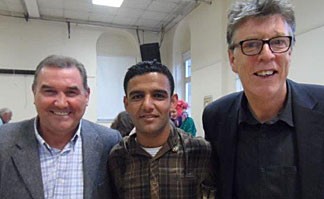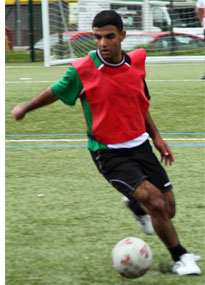FIFPro (World Football Players’ Union) on Mahmoud Sarsak’s jailing and torture by Israel
Mahmoud Sarsak: 'Football is my weapon of resistance'
Friday 14 June
FIFPro World - Anti-racism
FIFPro – represented in the person of anti-racism spokesman and FIFPro Division Europe board member Tony Higgins – finally met Mahmoud Sarsak - the Palestinian footballer, former political detainee and hunger striker - on Tuesday night June 11th in Edinburgh. In a packed hall Sarsak told his story about his detention in Israel and the plight of his fellow Palestinian players. Higgins was also in attendance to speak of FIFPro's work in Palestine.
'Mahmoud's story was a very harrowing one, particularly the account of his hunger strike, Higgins said. 'Mahmoud spoke passionately about his plight in prison as an innocent man and the conditions he had to endure during his time there.'

'I explained the work that FIFPro is currently involved with in Palestine and the contribution FIFPro made through our Secretary General Theo van Seggelen to obtain his release.'
Higgins emphasized that FIFPro is firmly of the view that any player involved in representing his club or national team should be allowed to travel freely domestically or internationally without any interference or detainment without trial.'
...Mahmoud Sarsak's began playing football at the age of seven when he was picked to play for a football school team in his native Rafah, Gaza. In 2002 Sarsak was called up to join the Palestinian under 17s. He captained the squad in tournaments in Norway in 2003 and 2004. He was top scorer in 2003 and was judged Man of the Match in all four games played in 2004.
Up to this point he had been primarily a striker, but his role changed to playmaker in midfield when he joined the under-21 Olympic team. He travelled with the squad to Qatar for the Asian Games in 2006 but was unable to play due to injury.
Sarsak was then promoted to the Palestinian National Team. As part of the squad between 2006 and 2009, he missed World Cup and Olympic qualifying games in Yemen, Syria and Japan because the Israeli authorities refused him permission to leave Gaza...

In 2009 the Palestinian Football Association arranged for Sarsak to join the Nablus side Balata, in the top division of the national league. He was at last granted a permit to leave Gaza for the Occupied West Bank.
It was at this key moment in his professional footballing career - as he waited to cross the border in July 2009 to take up a new role at top level in the sport - that he was detained by the Israeli security services.
'Every Palestinian is under threat at all times, but when this happened to me it was a huge shock,' Sarsak said. 'At first I thought it was a mistake, that they would soon let me out, as I had no idea why they had stopped me.'
What followed was several weeks of interrogation that he understood was intended to force him to confess to membership of the radical group Islamic Jihad. Despite being denied access to family or legal support and being subjected to freezing conditions, sleep deprivation and other forms of torture, he continued to deny membership of any such organisation. He was held for three years without trial under Israel's 'Unlawful Combatant's Law'. Similar to the regulations used by the US authorities to hold detainees without legal process in Guantanamo Bay, this law is widely regarded as itself unlawful.
'Every six months they would haul me up before a panel who would take less than two minutes to decide, without any evidence, that I was a threat to Israeli security and had to stay in jail for another six months,' Sarsak said. 'Prison was a grave for the living, so I decided to risk death on hunger strike to try and win my freedom.'
Throughout 96 days refusing solid food, through April, May and June of 2012, he was in solitary confinement and had no idea of the campaign of support that was building for him in the outside world.
It was pressure from activists lobbying government ministers, holding street demonstrations, gathering endorsements for letters and petitions from footballing organisations such as FIFPro and Show Racism the Red Card and from people such as filmmaker Ken Loach and former player Eric Cantona, that 'forced' Michel Platini of UEFA and Sepp Blatter of FIFA, to call for his release.
It was then that the Israeli authorities conceded defeat and announced that Sarsak would be allowed to go home to Gaza on July 10. 'When I was let out of solitary and re-joined other prisoners, they showed me media reports about all the fantastic support from people abroad. It was the first I knew about it,' he said.
As a typical football-crazy youngster in Gaza, Sarsak had read newspapers and been aware of the political situation, but it had never been a passionate interest of his. In jail, however, he studied social science, read widely - 'everything from Dan Brown to Paolo Coelho to Arabic classics to Russian novels' - and took part in political discussions.
Now Sarsak says he aims to devote his life to promoting the rights of political prisoners in Israel, in Gaza and in the Palestinian authority, as part of an international movement for prisoners' rights. Sport will be his particular tool for resisting injustice, he said.
'Freedom of expression, through football or any other means, is not to be denied by gagging or imprisonment,' he said.
Full report at FIFPro website 14 June 2013
See also report in Herald on Sunday 16 June 2013
Mahmoud and Alexei Sayle explain Israel's war on Palestinian football and why the apartheid state needs to be kicked out of European football.
Demonstration for Mahmoud Sarsak and all political prisoners at Tynecastle in June 2012
